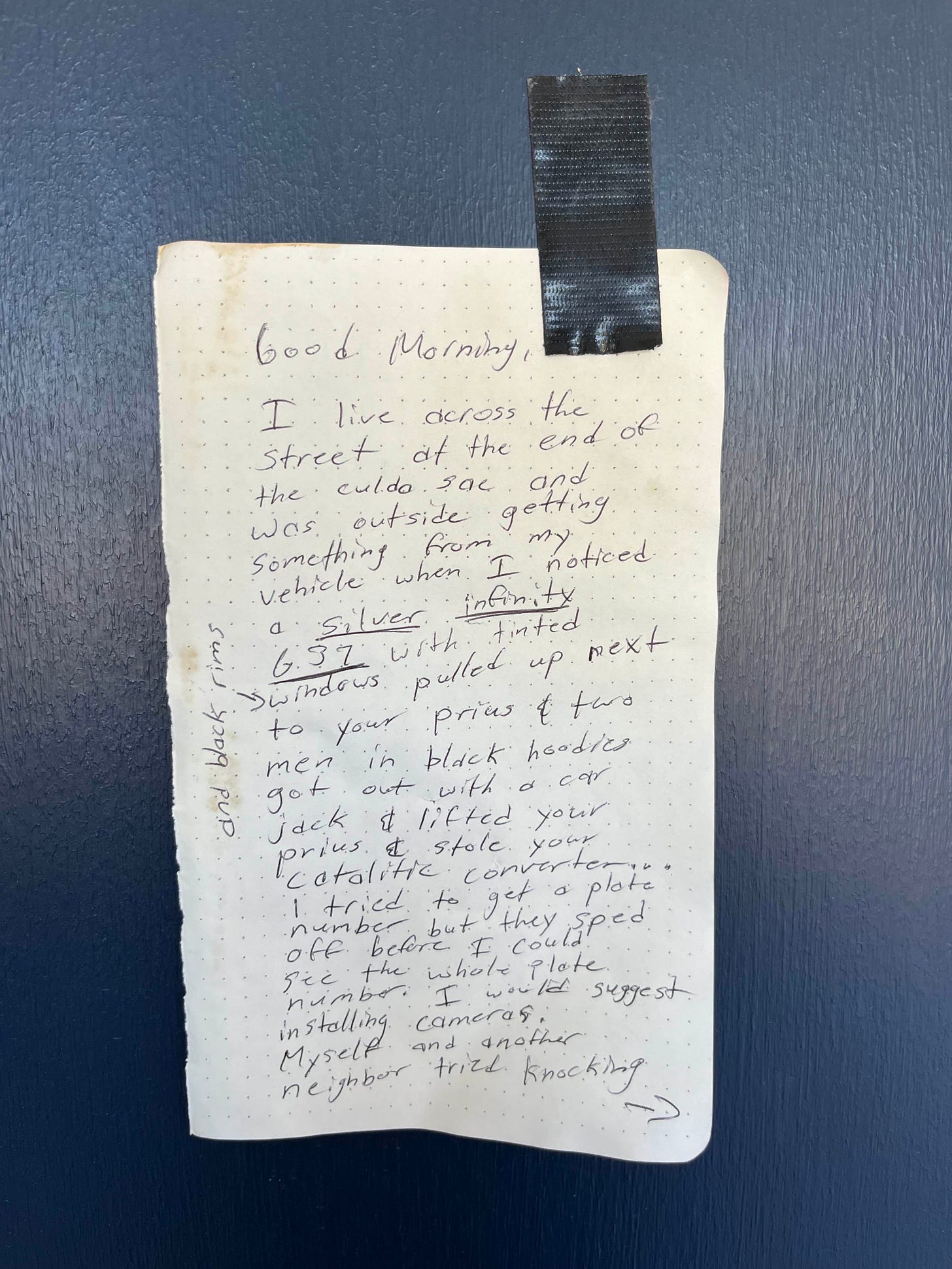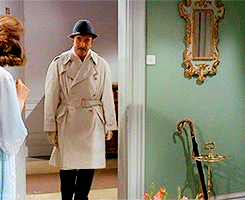I don’t know if you’ve been following the news over the past few decades, but the rule of law is under threat in America. On a recent Thursday morning, the consequences of our increasingly lawless society hit home. Literally. I woke up to find a note taped to our front door. The note was from an unidentified neighbor.
“I live across the street at the end of the cul-de-sac,” the note began. “[I was] outside getting something from my vehicle when I noticed a silver Infinity G37 with tinted windows pulled up next to your Prius & two men in black hoodies got out with a car jack & lifted your Prius & stole your catalytic converter.”
My first thought was: MOTHERFUCKER!
My second thought was: my neighbor makes liberal use of the ampersand symbol.
My third thought was: maybe the note is wrong, or some kind of prank.
I grabbed my keys, walked out to my car, and started the engine. Initially, it sounded fine. Then I heard a god-awful roaring noise, as if my engine was trying to belch out the words: AVENGE ME.
“Someone stole the catalytic convertor on my car,” I told Christina. “One of our neighbor’s left a note.”
“Oh no,” Christina said. “What are you going to do?”
What was I going to do? That was a good question. Fortunately, I had a good answer.
“I’ll tell you what I’m going to do, honey. I’m taking the case!”
The first 48 hours
According to 91 percent of contemporary crime novels, the first 48 hours of an investigation are the most critical period in any case. Supposedly, FBI statistics back up this claim, but most people accept the 48-hour thing at face value. Shows like the CBS true crime documentary series 48 Hours, along with buddy crime comedies like—wait for it—48 Hrs. and Another 48 Hrs.—have conditioned us to believe that crimes are either cleared in two days, or optioned to the producers of Unsolved Mysteries.
Unfortunately, I didn’t have much to go on here. The author of the note didn’t leave their name, so I couldn’t ask them, or the other neighbor mentioned in the note, for more information. I could’ve canvassed the block, but it was already 90 degrees out, and the temperature was rising fast. So, I decided to begin by working the digital angles of the case from the comfort of my air-conditioned office.
My first move was to go on the Nextdoor website to see if I could find any leads. Now, it should be noted that Nextdoor has a terrible reputation for racism, but it’s also important to recognize that the site is utterly fucking useless. I didn’t find any leads. But in addition to the racism, I saw:
Friendly posts about leaving water out for all the “critters” because it’s so hot.
Unfriendly posts about people who leave water out for the “critters” because standing water contributes to the mosquito problem.
Exterminator ads promising to kill all critters and mosquitos.
Frustrated, I decided to do what frustrated people all across this lawless country do. I posted my frustrations on Twitter.

Right away, I got some responses. My friend Gina thought I was joking, but I can’t blame her for thinking that because Gina and I are very funny people. A few other friends took the news seriously and expressed solidarity by saying kind things like, “screw those larcenous dickheads!”
My friend Phil, who also owns a Prius, sent me a direct message saying I was the “straw” and he was the “camel.” At first, I thought thieves had stolen Phil’s sanity, but I kept reading and realized that the theft of my catalytic convertor had inspired Phil to confront his long-running fear of this particular crime. Phil explained that he had “finally” purchased a “shield” from his local Toyota dealership. Phil’s advice was solid, but in terms of my investigation it was a little like shutting the barn door after the horse had galloped away.
But unlike Nextdoor, Twitter, which also has a racism problem, wasn’t totally fucking useless. In fact, the number of responses I received indicated that I had been the victim of a very common crime. And that realization reminded me that my buddy Joel, who used to own a Prius, had said something about this happening to him a few years back. I decided to check with Joel.
“It happened to us twice within six months,” Joel texted me. “After the whole experience (two times!), Lynne and I decided we might be better off just taping an envelope with $200 cash in it to the catalytic convertor and a note saying something along the lines of, just take this instead, it’s less trouble for everyone.”
Joel and Lynne are good people, the kind of people the world needs in greater numbers. But I didn’t like their solution. In fact, I wanted to go the other way with theft prevention and install a booby trap—ideally one involving an exploding dye pack and a spring-loaded chainsaw—to mark and maim the next bandit who dares to steal my catalytic convertor.
Instead of eating lunch, I feasted on visions of revenge. In one revenge fantasy, anyone with a black hoodie was fair game. But that fantasy turned out to be deeply troubling because I also own a black hoodie. Time and again, I felt like I was chasing myself. It was a very meta revenge fantasy, but ultimately, rather unfulfilling.
In another revenge fantasy, I infiltrated a gang of catalytic converter thieves by going undercover as a getaway driver called Jason Statham. I drove fast, I spoke with a charming English accent, and let me tell you, I had some amazing punchlines to accompany my actual punches. But the revenge fantasy hit a snag in the pivotal scene.
We were down at the docks meeting the buyers to do a deal—cash for catalytic converters. I hadn’t arranged for back-up because heroes never call for back-up. Just as the deal was about to go down, my cover was blown. Suddenly, everyone was Kung-Fu fighting. I kicked ass and I took names, and after I was done kicking ass and taking names, the police arrived on the scene.
My captain was pissed because in addition to killing twenty-eight bad guys with my bare hands, I had destroyed fifty-two vehicles, sunk three ships, set fire to the Port of Los Angeles, and injured hundreds of innocent bystanders—all of whom were certain to file a class-action lawsuit against the city. But all of that was collateral damage for a good bust. So, I said something clever I hoped they’d use in the trailer, then opened one of the shipping crates. That’s when the snag happened. I have no idea what catalytic convertor looks like in real life, and so in my fantasy, the crate was empty. I was fired from the force, but thanks to laws that favor the police, I kept my pension and avoided prosecution.
A dubious theory of the case emerges
“How’s the case going?” Christina asked.
“It’s not going at all. I’ve got nothing, zero, zilch, nada. A big ole plate of bupkis salad. The only bright spot is Phil suggested we get a shield, and Joel said insurance covered them both times. Which is good because a new catalytic convertor costs three grand, and our deductible is $500.”
“That’s it? These motherfuckers are just going to get away with it? No consequences? What’s this world coming to?”
I thought about quoting Leonard Cohen to remind Christina that everybody knows the dice are loaded, that everybody rolls with their fingers crossed, that everybody knows war is over, that the good guys lost, that the fight was fixed, that the poor stay poor, and the rich get rich. But maybe it’s an exaggeration to say that everybody knows that’s how it goes. Maybe some people haven’t gotten the memo yet. Maybe I’m married to one of those people. Maybe I could explain the situation in detail, but like Inigo Montoya, I was pressed for time, so I summarized the demise of the rule of law.
“Honey, Nixon got pardoned and became an elder statesman. The bankers who wrecked the economy weren’t prosecuted, they got bonuses with bailout money. And I don’t have to tell you about the coup, do I? Face it: we live in a lawless country.”
In her gut and in her head, Christina knew I was right. But in her heart, she still wanted justice, and if not justice, vengeance. Still, the question remained: who had stolen my catalytic convertor?
“Let me see that note,” Christina said.
I handed her the note.
“Fucking-A this guy uses a lot of ampersands,” she said.
“I know! It’s so distracting.”
“Distracting?”
I could see the wheels turning in Christina’s mind. Next to me, Christina is the best amateur detective in the San Fernando Valley.
“You’ve been looking for two guys in black hoodies driving a silver G37 Infinity?” she asked.
I nodded. I was looking for them in the sense that my office window faces the street and I’m always on the lookout. But it’s not like I had put out an APB; for some reason law enforcement doesn’t let civilians do that.
“Have you found two guys in black hoodies driving a silver G37 Infinity?”
“No. It’s not much to go on. This town is rotten with that make and model, plus black hoodies are a dime a dozen on Amazon.”
“Exactly!”
“What are you getting at?”
“Our neighbor writes a long note about what they’re doing when this went down, witnessing the crime, failing to get the license plate, etc.”
“So?”
“So, there are a lot of details in here. But when it comes to the suspects, the only thing our neighbor knows is that they’re men in black hoodies? And it’s dark. Remember that. But somehow in the darkness, our neighbor can identify the color of their hoodies at over seventy yards? That’s some eagle-eye shit.”
“Not eagle-eye enough to get the plates, or a better description of the thieves.”
“My point exactly!”
“I’m not following, honey.”
“The silver Infinity is a red herring.”
“Huh?”
“They left the note to distract us, throw us off the case!”
“Who? Who’s they?”
“Our neighbor! They stole your catalytic convertor, then they left this note so we’d spin our wheels looking for the wrong people.”
“You’re saying our neighbor is in on it?”
“I’m saying our neighbor is Mr. Big, babe.”
“And your evidence is what?”
“The note.”
“It’s not a confession, honey.”
“Isn’t it though?”
“No. It’s definitely not a confession.”
“Not if you read it verbatim, Mr. Lawyer Pants. But you need to think like a cop, a dirty cop. And what do dirty cops do, Michael?”
“Plant evidence?”
“Read between the lines!”
“I think you’re confusing dirty cops with literary critics.”
“I think it’s time to make an arrest,” Christina said. “Drag that motherfucker out of their home. I don’t care if they’re in pajamas, kicking and screaming. This is our bust. Let’s make the caller, babe!”
New shit comes to light!
On Sunday morning, I thought about rousting our neighbor. Or, rather I thought about rousting multiple neighbors, since I still didn’t know who had left the note. But kicking down a neighbor’s door and accusing them of a crime, without evidence, seemed unAmerican, even though we already traded concepts like truth, justice, and the American way for no-knock warrants, secret courts, and the “shadow docket.”
I wanted to solve the case, but I didn’t want to be a party to America’s 21st century dystopian project. So, I channeled my inner old school cop, then layered on a reliable trope, and took Christina’s car to go get a donut.
When I got back from the donut shop, one of our neighbors stopped washing his car and walked across the street to talk to me.
“Are you the one who left the note?” I asked.
“No, but I knocked on your door with another neighbor. I think he left a note for you.”
“He did. Do you happen to know his name?”
“No, it’s something like Shaggy. Or, maybe it’s Andy. No wait. I think his name is Chappy. Yeah, it’s Chappy, I think. Nice kid. He drives a black pickup truck.”
I looked in the direction of the cul-de-sac, but didn’t see a black pickup truck. Then I thought about the kid my neighbor had decided to call Chappy. Was he any relation to Chappy Sinclair from the movie Iron Eagle? That Chappy had conspired to steal fighter jets—a crime punishable by up to four years at the U.S. Air Force Academy. Was there something to Christina’s theory about the note’s author being the real thief? Maybe. But I decided to keep the potential Iron Eagle connection under my hat for now.
“Can you tell me what happened?” I asked.
My neighbor began to breathe heavily. I noticed sweat pouring down his face. Was I about to hear a confession?
“I’m sorry, I need a minute. Sometimes I faint.”
“Let’s step into the shade,” I said. “Do you want some water?”
“No, I’ll be all right. It’s just a spell. I have fainting spells.”
Suddenly, I noticed my neighbor’s Southern accent. Or, rather I noticed he sometimes spoke with a Southern accent that came and went with the breeze. He sounded like a cross between Foghorn Leghorn and Senator Lindsey Graham, with a dash of Dill from To Kill a Mockingbird. He had introduced himself years ago when we moved to the neighborhood, but I couldn’t remember his name. For clarity, and as an homage to James Lee Burke’s hardboiled New Orleans detective, I decided to call him Robicheaux.
“We knocked on your door, but you didn’t answer,” Robicheaux said. “Were you home?”
“I don’t know. When did this happen?”
“Three in morning.”
“Yeah, we were home. But we must’ve been asleep.”
“I was asleep in my bed when I heard something that sounded like a drill,” Robicheaux said. “Initially, I thought it was coming yonder way.”
Robicheaux pointed “yonder way,” in the direction of the cul-de-sac.
“Sound is a funny thing,” Robicheaux continued. “It can deceive you. Now, as I said, I was asleep in my bed, and at first I thought the noise was some foolishness from one of our neighbors. We’ve got some real characters on this block.”
“True.”
“But then I heard Chappy yelling, and I thought I better get my ass out of bed. Correction: I better get my fat ass out of bed and see about the commotion.”
Why had Robicheaux corrected the record just to fat-shame himself? And with all this casual fat-shaming, was he judging my ass? I clenched my butt cheeks, just to be safe.
“Anyway, I hauled my fat ass outside, but the thieves were gone. Chappy told me the whole thing took less than a minute. What he was doing outside at that ungodly hour, I’ll never know. But I’m glad Chappy caught a glimpse of them because he thinks they’re the same thieves who tried to hit the people down the street.”
Robicheaux pointed to a motor home a few houses down the street.
“They tried to hit a motor home?” I asked.
“Yes, but the owners were up late working in their garage.”
“That’s the family that does drag-racing, right?”
“That’s right, the drag racers. They’re real characters, making all manner of noises.”
“Yeah, the first time I heard them revving the engine on that car, I thought the Hell’s Angels were rolling through town.”
“Indeed. The vibrations from their engine rumble at such a frequency that they’ve knocked my good crystal off the shelves.”
“Oh.”
“Anyway, they were home working on their car late one night, getting ready for a race, when the thieves came for their catalytic converter. Thankfully, they heard the commotion, and scared them off.”
“And they tried to steal the catalytic converter from a motor home? Isn’t that hard?”
“Easy as pie. And when you think about it, that would’ve been the mother-load. They steal catalytic converters for the precious metals inside.”
I looked at the motor home, then back at my Prius.
“Yeah, I guess I’m small potatoes,” I said.
“It happens to everyone,” Robicheaux explained. “It’s dreadfully common. But they like the Prius because it’s a very easy target.”
“I know! It happened to one of my friend’s twice. And it turns out every friend who owns a Prius lives in fear that thieves will steal their catalytic converter. I just wish Toyota would make it harder to steal, maybe install a shield, or something.”
Robicheaux shook his head, then proceeded to explain capitalism to me.
“You have to keep in mind that Toyota has costs to think about,” he said. “They can’t just install a free shield. No such thing as free, you understand? They pass the cost along to you, and they mark it up. Every part must be profitable. Otherwise, it’s Communism, and Communism does not work.”
I wasn’t sure about Robicheaux’s treatise on capitalism. Fact was, I would’ve been glad to pay a few hundred bucks to prevent this incident.
“Have you filed a police report?” Robicheaux asked.
“No. I don’t think the cops ever catch these guys.”
“I agree. But I urge you to file a police report. If the police see two incidents on the same street, perhaps they’ll increase patrols. You could help them develop some leads.”
Leads? I had my doubts about that. Nextdoor is full of posts from people complaining that the cops can’t stop the two most common crimes in our area: illegal fireworks and illegal street racing. I didn’t see them working the case of the stolen catalytic convertor. In fact, the idea that they’d pursue any leads was laughable.
Unsolved Mystery
On Monday morning, I took my car to a nearby auto repair shop so my insurance company could inspect the vehicle. This wasn’t a lead, exactly. Still, I hoped the mechanic might be able to shed some light on this particular crime. But first, we had to deal with the preliminaries.
“Mr. Ferguson with the stolen catalytic convertor?” Charlie asked.
“Yes. Well, no, actually. My last name is Estrin. My wife is the primary on the policy. She kept her last name.”
“Mine too! I come from a super-traditional Mexican family, and they had their issues with my wife keeping her last name. But I support her choice. Do you, I always say. Besides, her career is really important to her. Everyone in her industry already knew her by her last name, and that was, like, ten years before I entered the picture.”
“Same boat,” I said.
“Some people still assume it’s all about the man’s name,” he said. “It’s always stuff like insurance claims, hotel reservations, takeout orders. Sometimes it’s funny. I try to have fun with it. We laugh about it, you know. But when I really think about it, it’s messed up that back in the day, a woman was just expected to take her husband’s name. Like, how weird is it to just suddenly be someone else?”
I knew what Charlie meant in more ways than one. Initially, I was Mr. Ferguson, at least as far as Charlie and GEICO were concerned. And throughout this caper, I’ve played the parts of the wacky vigilante and the hapless detective. None of those identities fit, not really. Truth is, I am Michael Estrin, amateur detective with hap, and I prefer justice to vigilantism.
“So, they got your catalytic convertor, huh?”
“Yup. It’s the talk of the neighborhood.”
Charlie knelt down by the car to look underneath at the crime scene.
“Yeah, it’s gone. But I knew that when I heard you drive up.”
Charlie snapped a few photos with his phone. Then he stood up and used his phone to file his report with GEICO. I had established a rapport with Charlie, so I decided to give my amateur sleuth alter ego one last go, for the files.
“Do you see a lot of these cases?” I asked.
“Everyday. Sometimes more than one a day. It’s like an LA rite of passage, or something.”
“I’ve been driving here since the mid-90s,” I said. “This is my first stolen catalytic converter.”
“You were due.”
“Must be a profitable crime?”
“They get about $800 for one. So, if you think about it, a team of two guys can hit four or five cars in a night, easy. And they don’t have to work for the rest of the week.”
“Someone’s paying them. There’s gotta be a Mr. Big.”
Charlie shrugged.
“Follow the money. Is that what they say?”
“I’ve never heard about the cops doing that,” I said.
“Nah, cops don’t care about catalytic converters. If they did, people in LA wouldn’t have even heard the words catalytic converter. There’s no stopping this crime.”
“Some people get a shield. Does that work?”
“Honestly?”
“Yes, please.”
“It’s just a little more metal for them to saw through. Maybe it slows them down by two minutes? That’s not much. Plus, they don’t know you have a shield until they jack up your car. It’s not a deterrent. I don’t think shields are worth it, and I’ve had mine stolen twice.”
I decided not to mention Joel and Lynne’s idea of bribing the thieves. Charlie seemed too cost-conscious for that.
“So, it’s hopeless?” I asked.
“Worse than hopeless.”
I knew it in my bones before Charlie uttered the next two words, the two words that had wedged their way into nearly every purchase of 2022.
“Supply chain.”
“How long is the wait?” I asked.
“For manufacturer parts, you’re looking at months. For after-market parts, a few weeks, maybe a little more, maybe a little less, depending…”
“Supply chain, huh? Way of the world these days, I guess.”
“Yup. It’s a real mystery, man.”
Thank for reading! If you’re new here, be sure to subscribe 👇
If you’re a returning reader, you know that Situation Normal runs on sharing. Please tell your friends & enemies 👇
TELL ME WHAT YOU THINK!
I love hearing from readers like you because it makes writing Situation Normal so much fun! If you enjoyed this story, please let me know by leaving a comment below👇
Or, if you’re the type of person who likes a prompt, consider the following questions:
Have you ever had something stolen from you? If so, what was it? Did you get justice, or revenge?
Who’s your favorite amateur detective? (Aside from me & Christina, of course).
Where do you stand on the ampersand & is it overused?
What does a catalytic converter do anyway?
If you were going to become a vigilante, what would you call yourself? Remember, Batman is already taken!














I like this plan! Maybe I can install a small camera on the fake C4 so I can see their eyes go wide with fear.
This was FUN. Since I am returning to writing I am looking for all the motivation I can get! So here is the absolute COOLEST thing about catalytic converters. They contain, as their name implies catalysts. The cool thing is the catalyst NEVER goes away but just makes things go better. The good news is they only contain VERY SMALL amounts of the catalyst. The bad news is the catalysts are amazingly expensive, way more expensive than gold. Be thankful that Christina Ferguson is not interested in rhodium earrings (unless she is).
Another thing...Nextdoor is a great source for inspiring silly stuff. The last time I was there the big news was a bunch of somewhat neighborhood folk were organizing a bus to visit the Creation Museum in Kentucky...roadtrip...while I never gave credit they inspired a post